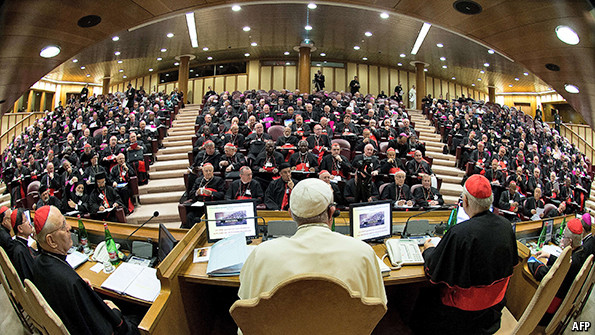At the first communion of my daughter, grandparents, godparents, aunts, uncles and cousins were all sitting in the pew with her. When it was her turn, she rose and stepped into the aisle. In rehearsal, we were told to get out of the pew with her and form a semi-circle around the communicant. This way we could watch her receive the body and blood of Christ and then receive it ourselves.
During the mass though, as we were rising to follow my daughter, the priest gave her communion and then, laying a hand on her shoulder, gently pushed her to the side. Truth be told, no one saw the first communion because it was administered so quickly. Only a few of us saw the push to the side. Here was one of the key liturgical celebrations in the Christian life, one that the family had gathered to witness, and the priest had valued expediency over it. An extra minute was all that was needed to affirm my daughter’s vocation as a disciple and my family’s commitment to raising children Catholic. Very simple.
I thought of this incident when I heard of Cardinal Pell’s talk at the recent meeting of the Voice of the Family, entitled “Why we are Worried: Key Issues at the Family Synod.” Cardinal Pell insisted that the Synod of Bishops on the family “will massively endorse the tradition” and that he does not “anticipate any deviation from that at all.” In short, nothing will change.
Reading this felt like a stone settling in my belly. I hear statements like those of Cardinal Pell, think about my daughter’s first communion, and realize how little pastoral support is given to those families who labor to be and raise faithful disciples. It is not that I desire changes in the church’s doctrines so much as having the church fully embody its teachings.
To be sure, the Catholic Church is doing a lot for marriages in trouble. Perhaps nowhere is this clearer than with Catholic Charities. In my small, poor, and rural diocese, Catholic Charities runs several programs, including:
- Adoption Services
- Clothing Assistance
- Natural Family Planning Instruction
- Baby Clothing and Diapers Assistance
- Disaster Related Home Repairs
- Electric Bill Payment Assistance
- Food Assistance
- Formula and Baby Food Assistance
- Gas and Bill Payment Assistance
- Heating Bill Assistance
- Pregnancy Counseling
- Marriage Counseling
- Rent Assistance
- Saint Vincent de Paul Stores
This is great work, and it touches on issue of poverty, conflict, abortion, care of the elderly, embodying so much of what the church teaches. Yet, all of this is triage, identifying problems and prioritizing help.
What is missing is what nourishes marriages, what enables them to live out their vocational calling. The current approach so often relegates families to being entities in need. Instead, as Saint John Paul the Great noted in Familiaris Consortio, families should be understood as essential for:
- forming a community of persons
- serving life
- participating in the development of society
- sharing in the life and mission of the Church
This conception of the work of the family is what so often seems missing from parish life. Its absence is why “nothing will change” statements are problematic: they imply every thing is fine when, in fact, pastoral practice is insufficiently Catholic. It deals with those in need, but I have struggled to find parishes or practices that foster the fullness of the family’s vocation. Church leaders have focused on families as those who “receive the love of Christ and become a saved community” but need to find ways to affirm and support families whose work is also “to communicate Christ’s love to their brethren, thus becoming a saving community.” (Familiaris Consortio, 49) What I hope for at the upcoming meeting of the Synod of Bishops is a change to more fully embody the Catholic faith. I hope the ministries like Catholic Charities receives even more support but also that pastoral changes are made to make it easier for families to be communities of genuine love.






Great post, Jason! I love the potential and the aspiration of this vision of support. Reaching for all that we can be and all that we can do for one another is important for all of us – INCLUDING those in need. Thanks!
You’re right that there should be greater support (and appreciation) for families. I’m not sure that’s primarily a concern of the Synod though, as this seems to me mostly the work of the local Church. And that is a very tough task for the local Church. At my last parish in Ohio, my husband and I served on the adult faith formation team, trying to reach out to young adults and families. In short, it was very tough to get participation. At our parish here in NJ, my husband has done a few talks for parents of first communion kids. Even at these “required” talks, there is poor attendance. In part, I think many parents have a consumeristic model of Catholicism. They are focused on what they are consuming from the church instead of what they are producing FOR the Church. Parents who feel our parish’s sacramental prep is too demanding simply opt out of the parish and go to the next town over. Several of my friends did this, in fact, because our priest required that the children attend Sunday Mass as a class (he didn’t want first communion to be their first time at Mass), and Sunday Mass interfered with hockey practice. What is ironic to me is that parents are such good producers for their kids’ hockey or baseball, which requires parental volunteer hours, but feel that any expectations, however minor, for the Church are unfair. What pastoral changes would you envision?
Thank you so much for this. It describes so well how I have felt in my parish for the past three years. I would be interested in knowing practically how that support could be provided. In my experience, what is most lacking is the formation of a true community. In a place where there is a sense of community, people will not hesitate to attend talks or volunteer whatever time they have. But where community doesn’t exist, in my experience, there’s a sense of the Church as a market for the sacraments – put in what’s required (ideally as little as possible), and get the sacraments out. We’re not supposed to be getting the sacraments in exchange for anything, but frustratingly, I often feel like this is the arrangement that’s cultivated in the parishes I’ve had any interactions with.